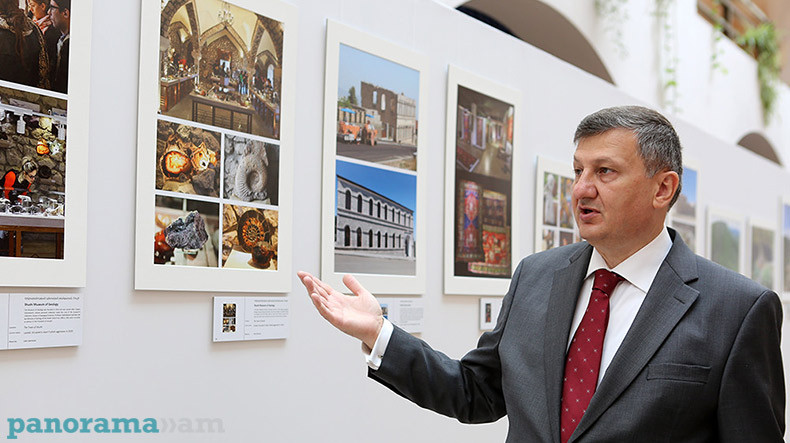
"Heritage in Danger: Artsakh": Azerbaijan may allow UNESCO mission’s entry into Artsakh for propaganda after some falsifications
"This photo shows both the Kanach Zham [Green Chapel] and Ghazanchetsots Cathedral; this is a panoramic photo of Shushi, which I took from the rooftop. The other photo shows the impregnable city of Shushi,” Vahe Gabrielyan, Director of the Diplomatic School of the Armenian Foreign Ministry, told Panorama.am, presenting the exhibits on display at the exhibition “Heritage in Danger: Artsakh” opened in the foyer of the Yerevan Municipality.
.jpg)
.jpg)
.jpg)
(1).jpg)
"At this exhibition, I basically tried to demonstrate that Artsakh has had a long-standing Armenian statehood and rich Armenian cultural heritage has been created in Artsakh over the centuries. Thus, in addition to monasteries and churches, the exhibition also showcases photos of medieval bridges, castles and other secular architecture. A castle is linked with military and sovereignty, while a bridge is connected to trade and economy. All this testifies to the fact that in the Middle Ages we had a developing economy. In one of the photos you can see Melik palaces and next to it a map of the Khamsa Melikdoms, which were sovereign units. In other words, we show history as well.
“This is the Gyulistan fortress, where the famous treaty was signed. Here is the village of Gyulistan, destroyed by the Azerbaijanis during in the 1991-1994 war. One of the photos shows the Karmir Khach Church [Red Cross] in the village of Tumi and the protocol of its construction in 1000 AD. That is, the church was built by Armenian princes and kings and in 1000 AD. Therefore, Armenians ruled it in 1000 AD.
“Carefully examining the exhibition, including the printed books, manuscripts, carpets, buildings of different periods, we see that it represents the long-term Armenian statehood, Armenian identity and culture. You also see contemporary images of spiritual life, churches,” Gabrielyan says.
The exhibition mostly features photographs by Vahe Gabrielyan taken from 2006-2007 to 2019, photos from the archives of the Foundation for the Study of Armenian Architecture, works by a number of other photographers, photos from the archives of the Mother See of Holy Etchmiadzin taken during the patriarchal visit of Vazgen I in 1957, the patriarchal visit of Karekin I in 1995, the patriarchal visits of Catholicos Karekin II and Catholicos Aram I in 2016, Shushi carpets, books published in Shushi provided by the National Library, medieval manuscripts that are exhibits of the Matenadaran.
“The photos from the visit of Vazgen I in 1957 show how the Armenian Shushi was destroyed, Ghazanchetsots Cathedral and Kanach Zham were half-dilapidated, while Gandzasar and Amaras were in a deplorable state. During this visit, Vazgen I was also in Gandzak,” Gabrielyan noted.
The photograph taken during the visit of Karekin I to Gandzasar shows restoration work, while in the photographs from the visit of Catholicos Karekin II and Aram I, the restored and well-equipped spiritual centers can already be spotted.
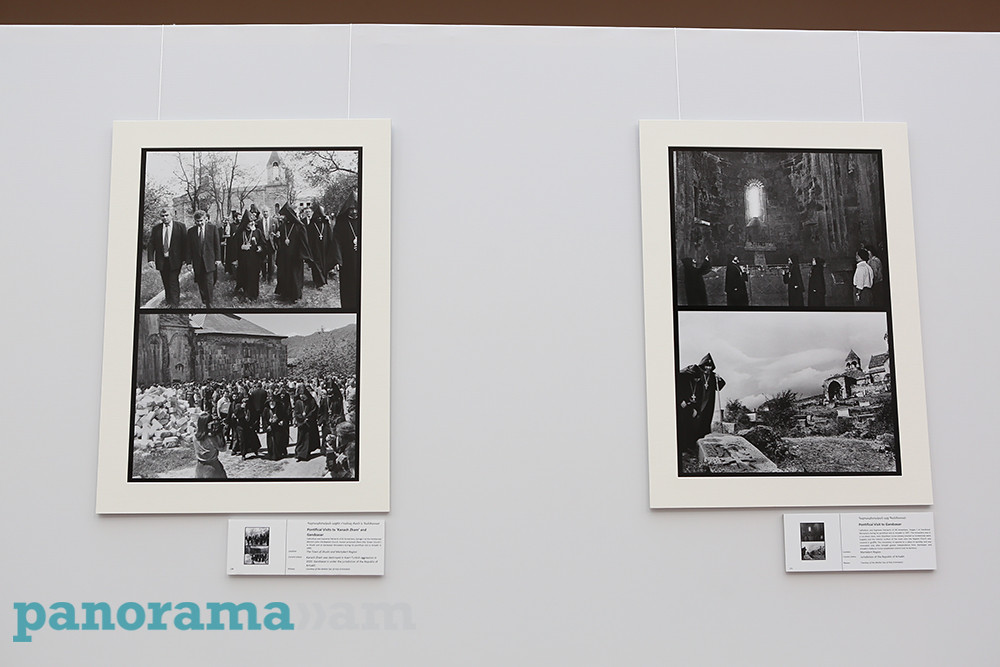
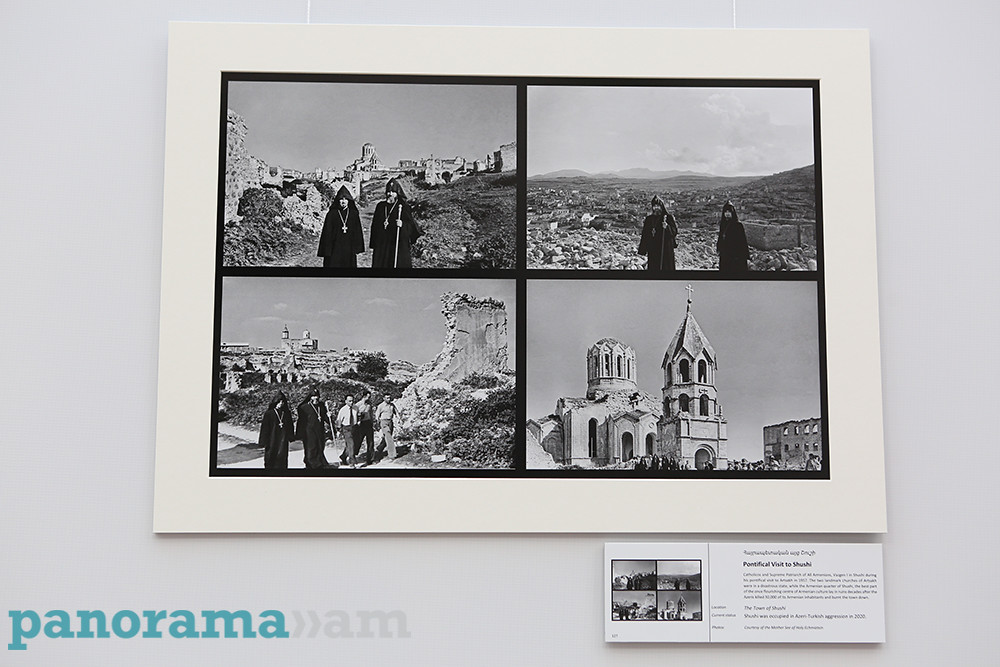
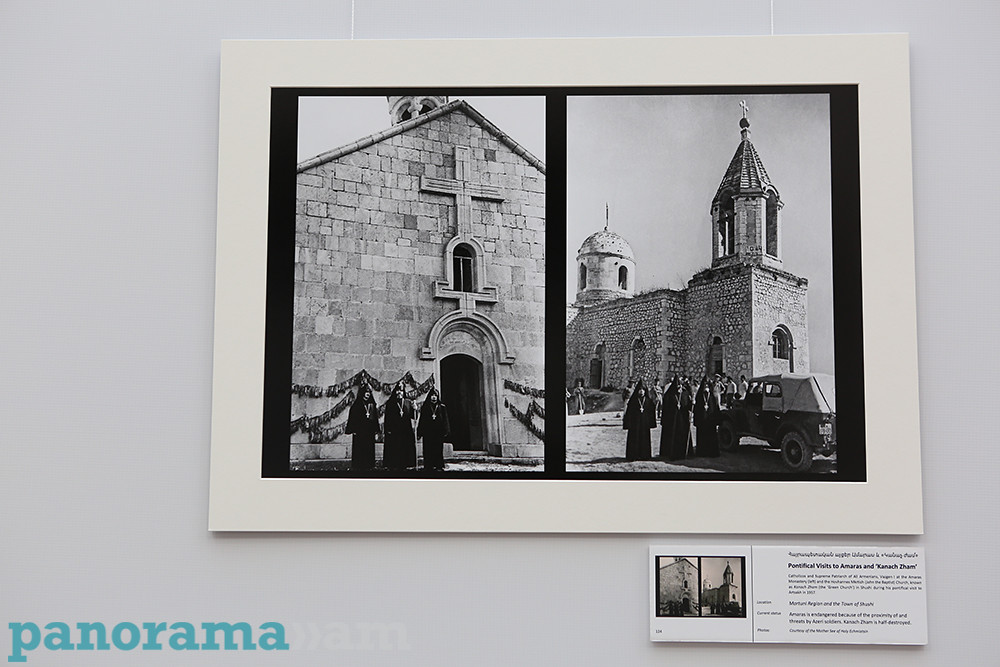
Books and medieval manuscripts published in Shushi are also on display at the exhibition.
“Shushi was among our first printing centers after Etchmiadzin. Until 1920, more than 145 books were published there. We have showcased the original versions of several books published in the late 19th and early 20th centuries and images of several such books, which will later be presented at traveling exhibitions.
“Works by Armenian authors were selected from the books, for example, grammar of the Armenian language, works on theological knowledge, textbooks on Christian life, etc., as well as translations from different languages,” the director said.
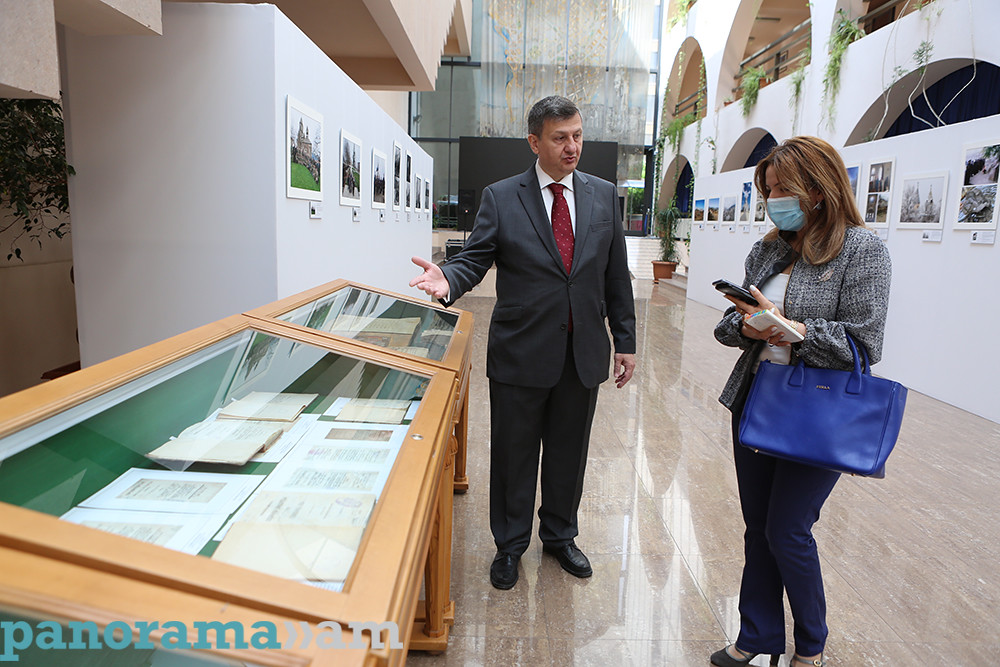
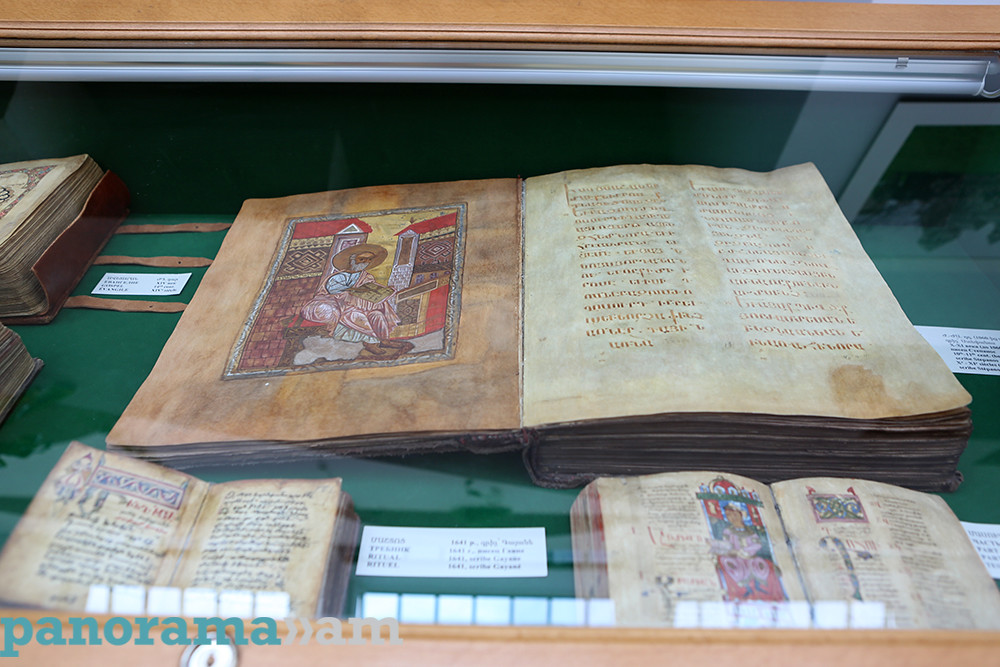
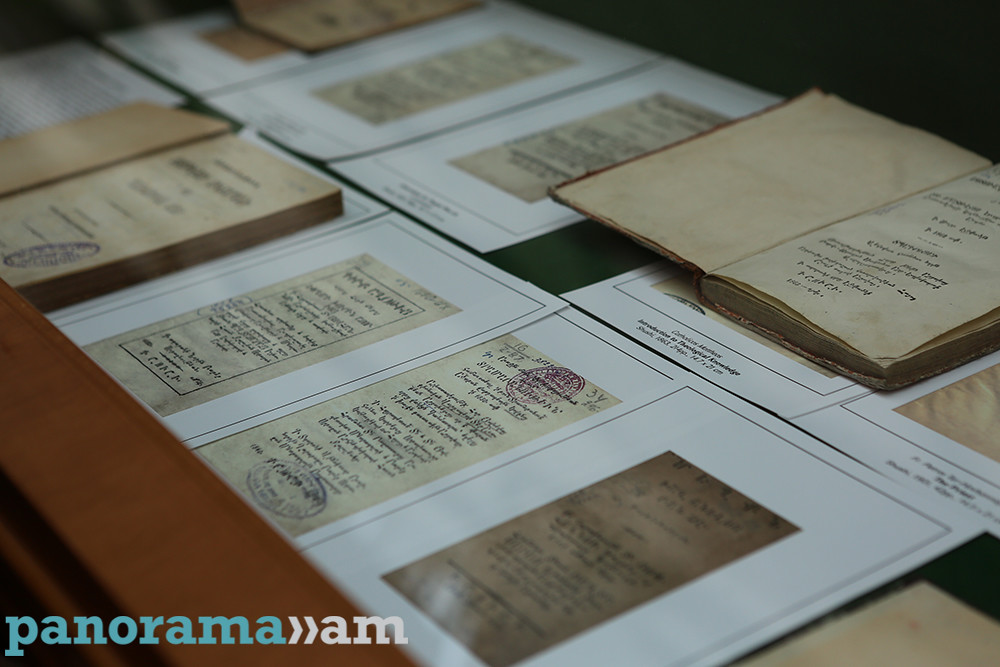
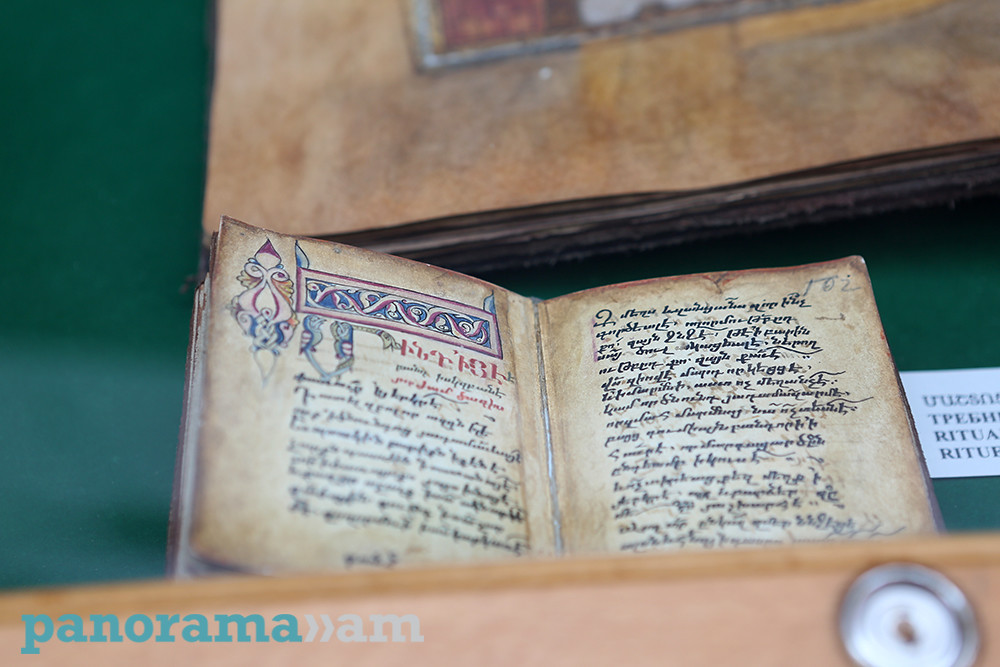
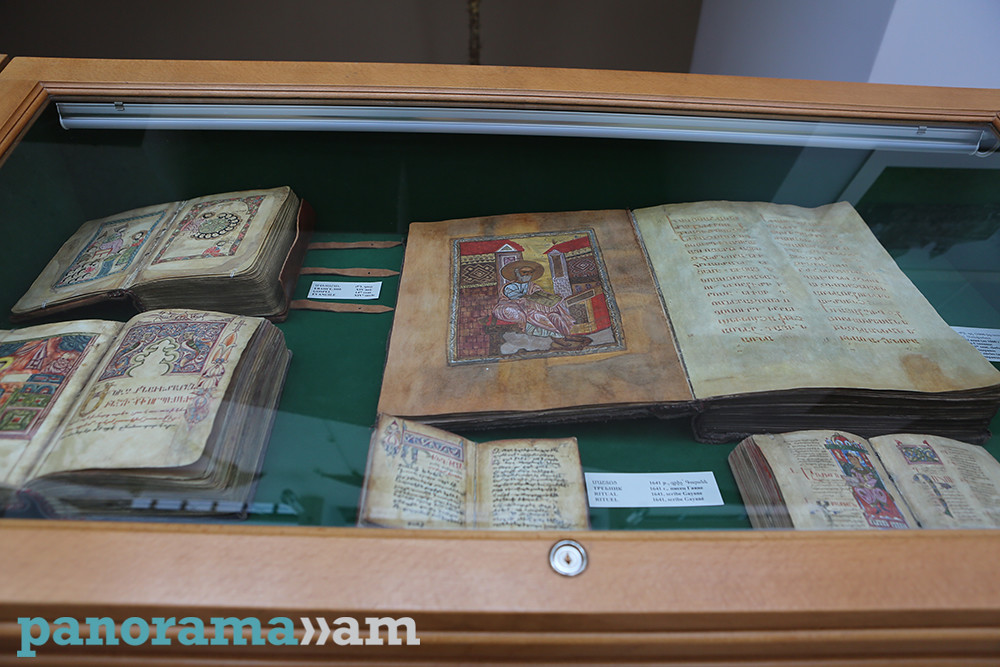
Vahe Gabrielyan noted that they tried to present all the heritage of Artsakh at the exhibition.
“It includes the heritage that fell under the control of Azerbaijan, as well as samples from the territory that is controlled by Artsakh. The one under our control is in some sense also endangered, because we are dealing with an enemy whose intentions are not good, and it may launch renewed attack tomorrow if we fail to prevent or retaliate it. The heritage under the control of Azerbaijan is under threat simply because it can be either destroyed or distorted and presented wrongfully.
“We saw what state Shushi was in: after the pogroms of 1920, fire and destruction, it was held by them [Azeris] and from the 1920s to the 60s they did not restore it. The Mekhakavan church was completely destroyed, even the monuments of the Great Patriotic War were vandalized and destroyed,” Vahe Gabrielyan said.
In case of some churches, Azerbaijan is trying to change the perception of their belonging.
“Amaras Monastery is also in danger, although it is under our control; it is factually under direct target, our pilgrims, visitors cannot easily enter it without being accompanied by Russian peacekeepers. We should call attention to all this so that everyone understands that the Azerbaijani side has no good intentions, they have hostile attitude and seek to appropriate and destroy our culture, which has been created for millennia. Our goal is to record and show that this heritage is ours, it was ours, has Armenian origins and was created by the Armenians over the centuries.
“Of course, the only effective and guaranteed protection can be ensured by our armed forces. If you have an army, you can protect it, there can be no other 100% protection. We must make every effort to protect the heritage beyond our control through the efforts of the international community. We must constantly emphasize, demonstrate, make it clear to people and reinforce the fact that this heritage is Armenian and must remain so,” Gabrielyan noted.
Speaking about Azerbaijan's refusal to allow the entry of the UNESCO mission into Artsakh, Vahe Gabrielyan said the reason behind their move is clear.
“They are trying to destroy the Armenian trace and identity. It is possible that after carrying out some falsifications, they will allow it [the visit of UNESCO mission] for propaganda, in order to show the word. But what will remain by that time? Everything can be expected from Azerbaijanis and Turks. Now all this wealth has fallen into their hands; with enthusiasm and in euphoria they are trying to strengthen their victory, they will take every possible and impossible, moral and immoral step, as there are no boundaries for them. They will spend money to present them the way they want and bring some people. It is our duty to resist it and present the truth,” he said.
.jpg)
.jpg)
.jpg)
.jpg)
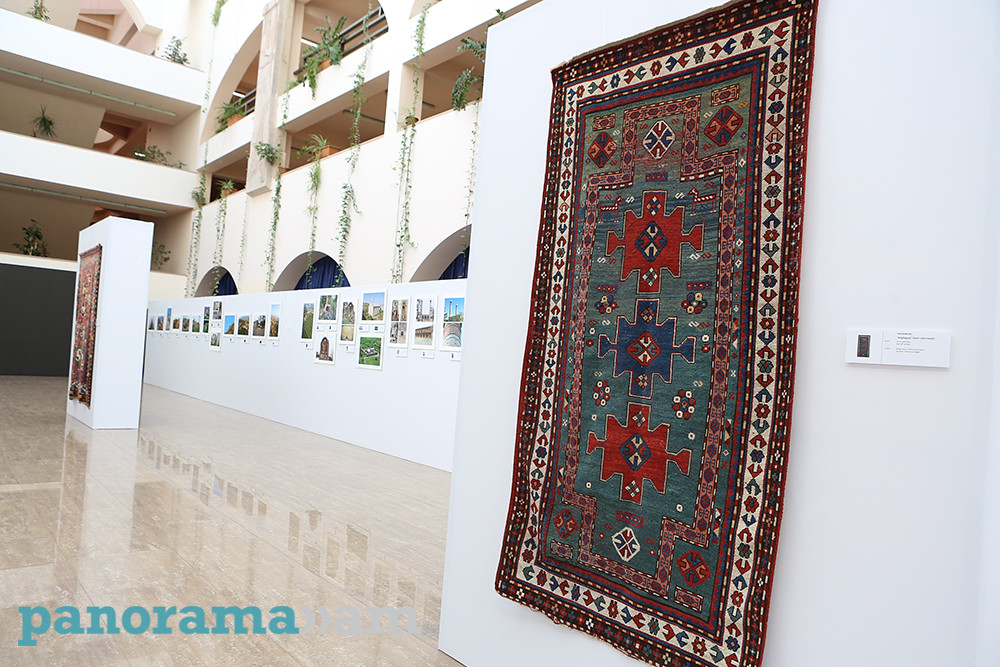
Newsfeed
Videos






























